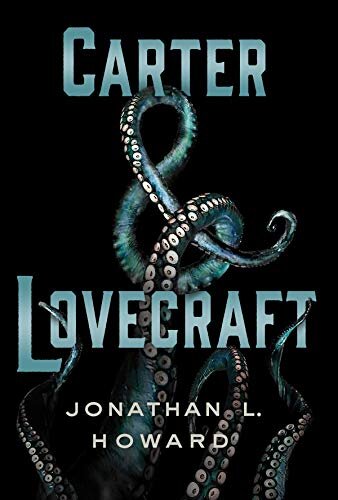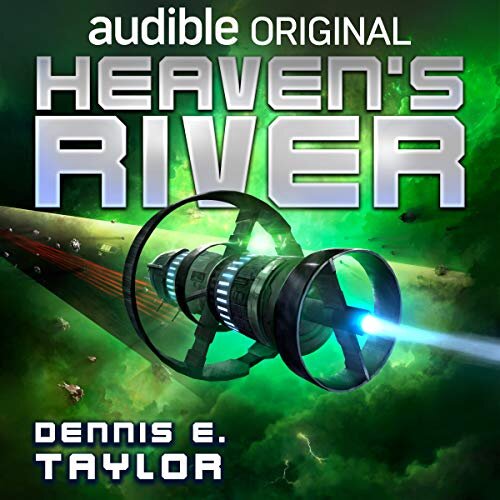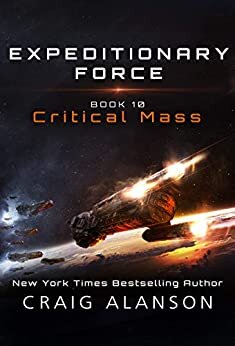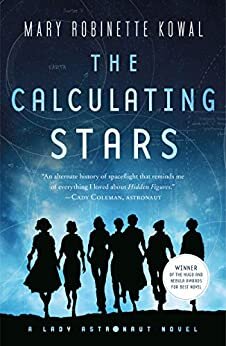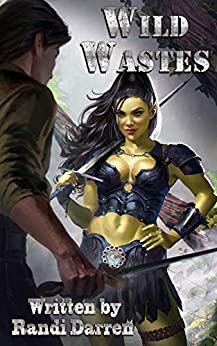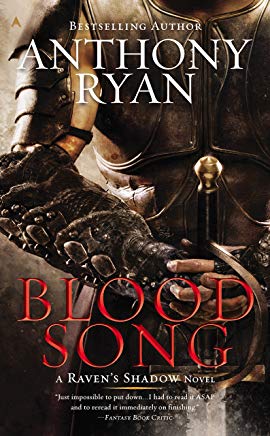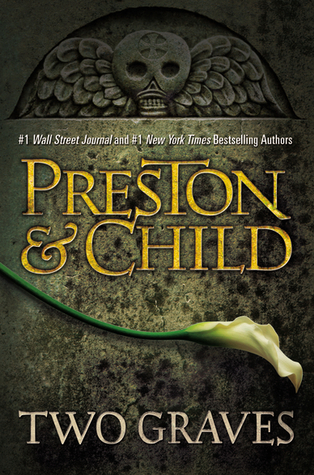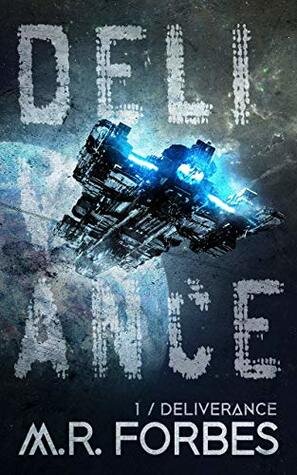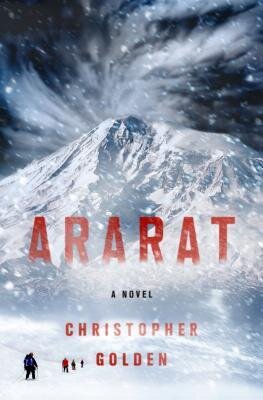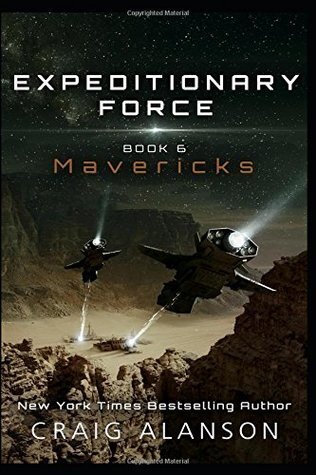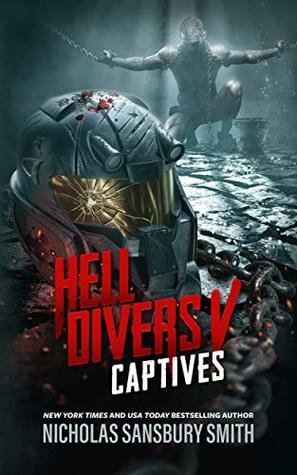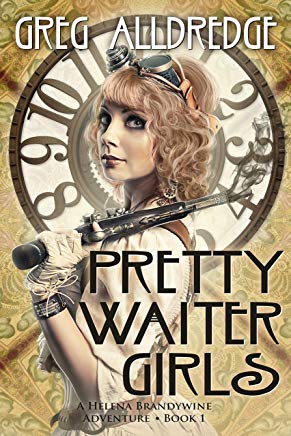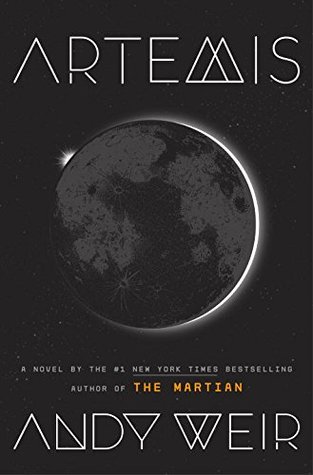My Book Reviews
Hello, and welcome to my book reviews. I want to emphasize that most of what I include in my reviews is simply my personal opinion, and encourage everyone to read and experience a book for them self. You may have a completely different experience than me. Which is why one reviewer isn't right while another is wrong.
Books I’ve read lately.
 Heaven's River by Dennis E. Taylor
Heaven's River by Dennis E. TaylorMy rating: 5 of 5 stars
Taylor is completely at home within his Bobiverse setting. Here's to hopping for much more. Ray Porter reminds us why he is one of the best narrators in the game. Superb writing married with outstanding narration. Bravo.
View all my reviews
 Critical Mass by Craig Alanson
Critical Mass by Craig AlansonMy rating: 5 of 5 stars
I have struggled with Alanson's Expeditionary Force series at times, as I feel it dips a little too much into the "Made for TV Episodic" format. Meaning? Each installment is really just about the conflict they're dealing with at the moment and the wholly fantastic, and however unrealistic means the Merry Band of Pirates come up with to get humanity out of that particular mess. I almost gave up on the series after book 9, but thanks to a little second guessing, I decided to give Critical Mass a shot. Thankfully, Alanson has returned to form and reinvested me. We are reintroduced to the bigger picture (The Elders) and what it all means for humanity.
View all my reviews
 The Calculating Stars by Mary Robinette Kowal
The Calculating Stars by Mary Robinette KowalMy rating: 2 of 5 stars
I listened to The Calculating Stars on recommendation of a friend. The start, as many other reviewers have identified, is a riveting and well-crafted hook. It really is a fantastic set up, and promises what great science fiction usually does-cataclysm and how a protagonist will resolve or work around it. Unfortunately, after the exciting introduction, the rest of the narrative devolves into a rather flat, predictable, and frustratingly passive affair. I actually stepped away from this book several times, moving to other audio books because I just couldn't stay interested. I did finish it, in the end, and will say this much - Kowal is a good writer and narrator. That much is clear. But she seems to shy away from telling this story through the active moments that could have really set this story apart. Most of the narrative is presented with dialogue-people having meetings about what did, what will, or what is happening. There are even some really important, riveting moments relegated to lines of dialogue that miss the chance to strike any kind of emotional chord. Much of the conflict in this story is interpersonal differences, (man vs man), or Elma's own struggles with anxiety (woman vs herself). And yet instead of utilizing these complications to amplify humanity's impending doom, they take over for it. This results in a narrative that is very passive, and by that, I mean inactive, which feels strange for a story rife with such wonderful conflict and tension. Unfortunately, it falls flat. There are also some moments of cringe. I understand the main character is a scientist, as is her husband, and most of the ancillary characters. But the sexy scenes felt forced, as well as all the child-like giggle-worthy rocket-based sexual innuendo. I love when good romance or sexual tension is added to a story, but unfortunately, this felt like a sanitized, awkward, I want my characters to have intimacy but I don't want to alienate younger readers, kind of delivery. All in all, the Calculating Stars feels like a fantastic premise that ultimately betrays its promise in the end. Why? You've got a female protagonist functioning in a time when when women were just starting to come into their own voice. Is it bad? Heck no. But did it deliver the story I was expecting from a Nebula winner? Sadly no. I am still undecided if I will read any further into the series.
View all my reviews
 Deliverance by M.R. Forbes
Deliverance by M.R. ForbesMy rating: 2 of 5 stars
What did I just read, or more succinctly, listen to? Honestly, I found Deliverance, Forgotten Colony one of the most frustrating pieces of fiction in recent history. Why? For a plethora of reasons, starting with...
The paring of narrator Jeffrey Kafer and M.R. Forbes. Kafer's narration style for this story is interesting. It is breathy and edgy, as if equal parts Clint Eastwood and Duke Nukem from the eponymous video game serious. Is this how they think soldiers talk? It is cliche, and honestly, incredibly distracting, especially when Kafer falls into his descending rhythm, where his volume and cadence dips into an almost breathy whisper at the end of each sentence. Mix this with Forbe's writing, which dips into...
Repeat words, excessive passive voice, ending sentences with prepositions, and so on. When in dialogue, there are up to 7-8 concurrent back and forths that all end in "said". Reading that might not be a problem, but when narrated, holy crap. Beyond my issues with the story, there are many examples of amateur writing that could (or should I say should) have been cleaned up by more extensive editing, or even a round of reading with a good group of Beta readers. Sentences such as "the plan wasn't going according to plan" is just the tip of the iceberg. Forbes also insists on referring to the Trife (or Tryfe) as demons seemingly only in combat sequences, and then Trife (Tryfe) during casual conversations in between. This felt odd. And speaking of the aliens...
It is very clear that Forbes was inspired by James Cameron's Aliens, but unlike Ridley Scott's Xenomorph, I found Forbe's Trife to be wholly disappointing. He never paints them in anymore detail than "oily black skin" "long claws" and "sharp teeth". I couldn't establish any kind of visual reference for them in my head, and they served only as the "antagonists" that were usually swarming in numbers too great for our protags to overcome. They were poorly fleshed out monsters that were evidently capable of pushing an advanced race off of their world, and oh yeah, incredibly easy to kill. The ending sequence is even borrowed completely from Aliens, as our heroes find themselves in the aft portion of the ship, where energy exchangers sit out in the open, and if damaged by projectile weapons, would cripple the ship. I flashed back to Apone and Lieutenant Gorman in Aliens, collecting magazines and directing the Colonial Marines to use "flame throwers only". But those Marines were walking into territory it didn't know against a foe it couldn't fathom. That was story and cinema gold - tense, terrifying, and gut-wrenching.
The Xenomorph in Alien was terrifying because it was intelligent, horribly alien, difficult to kill, and incredibly adept at killing. Beyond the obvious - that it gestated it's young inside living human hosts. Heinlein used the swarming masses approach with the "bugs" in Starship Troopers, but they were a foe worthy of fear. They weren't necessarily the most intelligent of beasts, but they were difficult to kill, and very adept at tearing humans apart. I was drawn to this story based on the premise - an enemy came to earth and was wiping mankind out, forcing them to flee to the stars. I thought yes, another alien to fear. But these creatures? I felt no fear of them, especially when our Marines continually one shot killed them, and when they ran out of ammunition, our squad of Vultures successfully fended off thousands with only knives, where a battalion with advanced weapons and armor could not. But people continued to die because...
The Trife have sharp claws. And in a world where we can launch generation ships out of orbit (seriously? Check the physics on breaking orbit with that much mass) replace severed limbs (with materials the Trife can't even dent - author's words, not mine) and yet our poor, fodder Marines continually die because the Trife have sharp claws and the neck joint in their armor was weak? They have advanced heads up displays and links to provide real time bio data of each soldier, but it is so important for them to turn their heads. No. Just no. Medieval knights understood the importance of protecting the body's vital areas. Chain mail, scale mail, overlapping plate, studded leather, and brigantine armor were all used to various success. But those people needed to die, and the Trife needed to be worthy foes. This is convenient, in the same way plot armor kept the protagonist alive, while his contemporaries died in the droves.
Lastly, the introduction of the scavenger's POV feels like it was only included because the author needed a way for the Trife to get into the ship. Beyond that, he wasn't a likable figure. He lets those people that try to help and save him die, and while cornered, flashed some Mary Sue style gutless wonder powers. Hey, all you need to survive the Trife is a six-shooter, a knife, and a bunch of brave, selfless people to throw between yourself and the enemy. All of this = disengaged.
I am truly surprised by the large amount of rave reviews for this book. Forbes isn't a bad writer, but I do feel like this story missed out on a large amount of necessary development, and thus, potential. This kind of story intrigues us because it promises a "humanity's last stand" premise, a test of true grit, ingenuity, and survival instinct. An antagonist truly worthy of fear and respect. And a troop of ordinary people exhibiting real heroics in the face of insurmountable odds. Instead, we get trope-heavy characters (Washington carrying a mini-gun, a.k.a Jesse Ventura circa 1980's Predator and every wannabe blockbuster after). And none of them understand squad tactics, troop movements, or supply chains. For a military sci-fi story, Deliverance delivered very little tangible, believable military meat. If the world has fallen beyond these bunkers, where is artillery support? Mines and delay barriers? Heavy weapons and air support? King Leonidas held off a Persian army of hundreds of thousands with 300 Spartans, utilizing sound tactics and an environmental pinch point. Here? Well, humanity had no Leonidas, and it shows.
I went in with high hopes, especially considering the sheer volume of sequels Forbes has already written. Unfortunately, I fear my search for colonization science fiction will have to turn elsewhere.
View all my reviews
 Traveler by Dennis W. Green
Traveler by Dennis W. GreenMy rating: 5 of 5 stars
Traveler, by: Dennis W. Green.
I met Dennis Green at a recent science fiction & fantasy convention. I asked him to pitch Traveler to me, while chatting at the author meet and greet. I have to admit, I was hooked before he paused to take his first breath. We decided to swap books, read, and review the other’s work. Here are my unbiased thoughts on Traveler:
Sometimes, authors can get carried away with the ideas and concepts that constitute the science of their fiction, yet on others, they focus so intently on the spatial backdrops, or otherworldly settings, that the story inherently suffers. But in some cases, the author is able to balance the scales and achieve a harmonious blend with what is known to us and that which is abstract, or foreign. On occasion, it is that perfect amalgamation of genres that captivate our inner science fiction geek, while at the same time fulfilling our need for suspense and good old fashioned mystery. Enter Traveler.
At its heart, Traveler seeks to examine the complex relationships between probability, reality, and choice, while also keeping its feet relatively close to the ground (literally, not figuratively). This is some heavy science to confront, and done differently, could have tipped the scales and completely changed the dynamic of the story. With that said, Green hits the sweet spot (in my opinion) and has crafted a story that is equal parts human interest and mind bending science.
It is a credit to Green, as both an author, and a storyteller, that the confluence of moving plot pieces comes together to form such a clean, well-paced, and captivating plot. The science is dissected and presented in such a way that it is easy to understand, while also believable. Part of this success lies with its characters. Trav Becker is a great main character, but so are Trav Becker, Trav Becker, and also, Trav Becker. Never before have I been presented with the same character in such different ways, and thanks to concise writing, kept them all straight. Trav Becker is flawed, contrite, and as far as leading men go, top notch. We learn some valuable lessons about life from him, such as the weight of the decisions we make, the lasting effect of consequences, as well as the idea of forgiveness. All of this is thanks to his various iterations.
Sam is another strong character, and counteracts Trav’s Captain Kirk as a more logical and emotionally controlled Spock might. He is a necessary function for the plot, as he provides both back-story, and the implications of the science itself. I found Sam to be likable, well-formed, and generally easy to care about. Mary presented a very unique opportunity within the plot, as in one instance, she represents a love lost, while in another, a love fulfilled. I really like the dynamic she represented, and how she was utilized within the story. Morgan is another personality that makes the most of her limited page time. She provides a classic, non-scientific link to Trav’s predicament, while also squashing many of the stereotypes associated with female characters in fiction. I am confident that Morgan will win a place in many reader’s hearts, just as Trav, Sam, and Mary (and Morgan) have in mine.
I found Traveler to be an intriguing, addictive, and heart wrenching read, and can honestly say that its story, and its characters, will stick with me. I have read some reviews that criticized the book because of its various interludes. After the first such break in action, I was prone to agree. Yet, as I progressed through the story, and learned more of the science woven into the plot, the more I started to appreciate them. Through these interludes, Green is able to expand the scope of Traveler, and also provide some tangible links to the science of a multi-dimensional world, both to significant events in world history, but also to pertinent achievements or events within the plot itself. I found these interludes wildly creative, and very successful at building the lore behind the science.
I give Traveler 5 stars. It is an engaging, genre-bending story with just the right amount of twists and turns. It offers wonderfully flawed and relatable characters, a vivid setting, and some clever music tie-ins (for us music lovers). I strongly recommend this book!
View all my reviews
 Sand and Blood by D. Moonfire
Sand and Blood by D. MoonfireMy rating: 4 of 5 stars
(Disclaimer) - I received a copy of Sand and Blood from the author, Dylan Moonfire, in a book swap, read and review.
I picked up Sand and Blood, and was hooked within the first 5 pages. I am a big fan of fantasy and science fiction, and I love books that blur the lines between the two. Sand and Blood is technically a steampunk fantasy, but does not fall victim to the trappings of the oft-used, and slightly worn out Victorian England. Instead, Moonfire graces us with some creative world building, and a setting that feels as fresh to us, as it is historically rich to its characters.
The book takes place in Fedran, a land built upon the bones and ashes of a more sophisticated society. This is implied, rather than stated openly, as we glimpse antique machines, as well as monolithic stone structures, all of which are used by the various clans. I love stories with depth; ones that allow us to peel back surface layers to explore the historical events that helped shape the people, and the world. I hope that this aspect of the world is explored in greater detail going forward, as we are offered a relatively small glimpse.
The plot is very linear, and moves quickly. The writing is crisp, and clean, although the character names, which are clearing of Japanese inspiration, can slow the read through. This wasn’t an issue for me until the character count started to rise. This resulted in a case of literary-vertigo, where I lost track of who was who, and what their significance was to the scene. This did clear up however, and as I progressed through the book, the vernacular started to feel more natural.
At the story’s center are five teens, all members of the Shimusogo clan. They partake on a journey, and are subsequently abandoned in the desert. The resulting conflict between the environment, each other, and rival clans, constitutes the bulk of the story. At its heart, Sand and Blood is a coming of age story, one of three teens fighting for survival, and in the process, forging their new identifies as adults. I found this dynamic very compelling, and relatable. I felt the pain, desperation, and triumphs from every situation. The world is stark, and dangerous - but only to a degree. Fedran itself felt like it could have been the greatest antagonist to the three teens, but instead, it took on a more passive role, and allowed the human characters to dominate the conflict.
I became quite fond of both Chimipu, and Pidohu, yet struggled to connect with Rutejimo, the story’s primary. Chimipu exudes strength and confidence, which is a stark contrast to Rutejimo. There is only so much whimpering I can tolerate from a main character, and time and again I found myself growing frustrated with him. I can only hope that, as the series progresses, we will see a more confident and mature Rutejimo emerge. Pidohu quickly became my favorite character, as he is dealt the lion’s share of adversity, and refuses to give up. He is a wonderful example of determination, and the embodiment of the will needed to survive life’s hardship.
Despite my divide with the story’s main character, I found Sand and Blood to be a thoroughly entertaining read. The world is rich with antiquity, and magic, and holds much promise for the various clans that call it home. I look forward to the next book, and only hope that Moonfire unearths some of Fedran’s history, and thus, its secrets. I give Sand and Blood a solid 4 out of 5 stars. If you are a fan of fantasy, science fiction, or steampunk fiction, I strongly recommend you give this book a read.
View all my reviews
